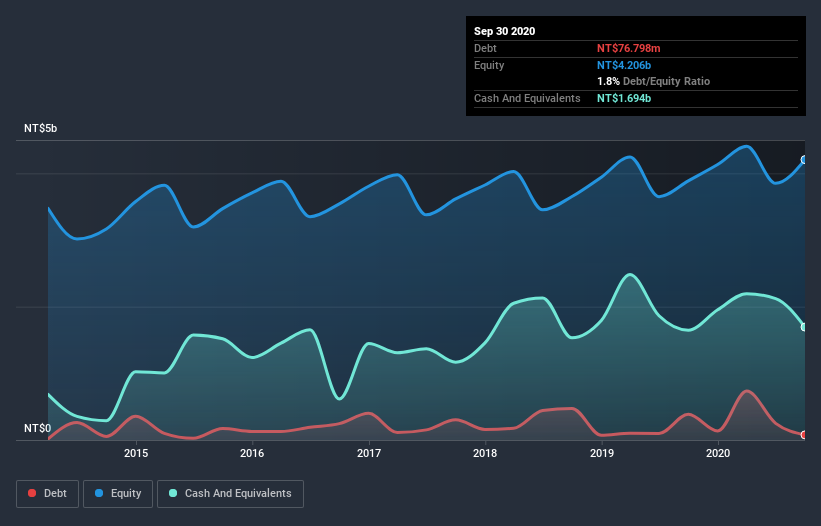
Legendary fund manager Li Lu (who Charlie Munger backed) once said, 'The biggest investment risk is not the volatility of prices, but whether you will suffer a permanent loss of capital.' When we think about how risky a company is, we always like to look at its use of debt, since debt overload can lead to ruin. As with many other companies TTET Union Corporation (TPE:1232) makes use of debt. But the real question is whether this debt is making the company risky.
What Risk Does Debt Bring?
Debt assists a business until the business has trouble paying it off, either with new capital or with free cash flow. If things get really bad, the lenders can take control of the business. However, a more usual (but still expensive) situation is where a company must dilute shareholders at a cheap share price simply to get debt under control. By replacing dilution, though, debt can be an extremely good tool for businesses that need capital to invest in growth at high rates of return. The first step when considering a company's debt levels is to consider its cash and debt together.
Check out our latest analysis for TTET Union
What Is TTET Union's Debt?
The image below, which you can click on for greater detail, shows that TTET Union had debt of NT$76.8m at the end of September 2020, a reduction from NT$385.2m over a year. However, its balance sheet shows it holds NT$1.69b in cash, so it actually has NT$1.62b net cash.

A Look At TTET Union's Liabilities
We can see from the most recent balance sheet that TTET Union had liabilities of NT$1.25b falling due within a year, and liabilities of NT$253.5m due beyond that. On the other hand, it had cash of NT$1.69b and NT$945.9m worth of receivables due within a year. So it can boast NT$1.14b more liquid assets than total liabilities.
This surplus suggests that TTET Union has a conservative balance sheet, and could probably eliminate its debt without much difficulty. Simply put, the fact that TTET Union has more cash than debt is arguably a good indication that it can manage its debt safely.
And we also note warmly that TTET Union grew its EBIT by 11% last year, making its debt load easier to handle. When analysing debt levels, the balance sheet is the obvious place to start. But you can't view debt in total isolation; since TTET Union will need earnings to service that debt. So if you're keen to discover more about its earnings, it might be worth checking out this graph of its long term earnings trend.
Finally, while the tax-man may adore accounting profits, lenders only accept cold hard cash. While TTET Union has net cash on its balance sheet, it's still worth taking a look at its ability to convert earnings before interest and tax (EBIT) to free cash flow, to help us understand how quickly it is building (or eroding) that cash balance. During the last three years, TTET Union generated free cash flow amounting to a very robust 89% of its EBIT, more than we'd expect. That positions it well to pay down debt if desirable to do so.
Summing up
While we empathize with investors who find debt concerning, you should keep in mind that TTET Union has net cash of NT$1.62b, as well as more liquid assets than liabilities. The cherry on top was that in converted 89% of that EBIT to free cash flow, bringing in NT$1.2b. So is TTET Union's debt a risk? It doesn't seem so to us. The balance sheet is clearly the area to focus on when you are analysing debt. But ultimately, every company can contain risks that exist outside of the balance sheet. Be aware that TTET Union is showing 1 warning sign in our investment analysis , you should know about...
If you're interested in investing in businesses that can grow profits without the burden of debt, then check out this free list of growing businesses that have net cash on the balance sheet.
If you’re looking to trade TTET Union, open an account with the lowest-cost* platform trusted by professionals, Interactive Brokers. Their clients from over 200 countries and territories trade stocks, options, futures, forex, bonds and funds worldwide from a single integrated account. Promoted
Valuation is complex, but we're here to simplify it.
Discover if TTET Union might be undervalued or overvalued with our detailed analysis, featuring fair value estimates, potential risks, dividends, insider trades, and its financial condition.
Access Free AnalysisThis article by Simply Wall St is general in nature. It does not constitute a recommendation to buy or sell any stock, and does not take account of your objectives, or your financial situation. We aim to bring you long-term focused analysis driven by fundamental data. Note that our analysis may not factor in the latest price-sensitive company announcements or qualitative material. Simply Wall St has no position in any stocks mentioned.
*Interactive Brokers Rated Lowest Cost Broker by StockBrokers.com Annual Online Review 2020
Have feedback on this article? Concerned about the content? Get in touch with us directly. Alternatively, email editorial-team (at) simplywallst.com.
About TWSE:1232
TTET Union
Operates as a soybean crusher in Taiwan, Malaysia, Japan, and internationally.
Outstanding track record with flawless balance sheet and pays a dividend.
Market Insights
Community Narratives





